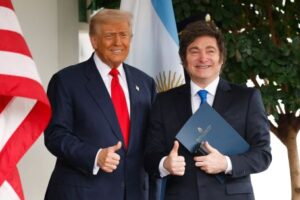
Argentina and Paraguay expedite OECD membership applications
Wednesday, November 12th 2025 – 09:30 UTC
Argentina had been invited to join the organization in 2022 but declined under then-President Alberto Fernández
Argentina has formally initiated the technical phase of its bid to join the Organization for Economic Cooperation and Development (OECD), submitting its initial memorandum to the Paris-based body. The document, a preliminary self-assessment of the country’s alignment with international standards, was delivered by Foreign Minister Pablo Quirno to OECD Secretary-General Mathias Cormann, who is currently visiting Buenos Aires.
The submission marks a significant shift in foreign policy driven by the administration of President Javier Milei. The OECD, often referred to as the club of rich countries, extended an invitation to Argentina in January 2022, but the previous government under Alberto Fernández declined to proceed. The Milei administration formally accepted the invitation on December 11, 2023, one day after the President took office, and has since accelerated the process.
The initial memorandum is a key document that assesses the degree of alignment between Argentina’s current legislation, policies, and practices and the comprehensive set of OECD standards. Its presentation launches an in-depth technical dialogue with 25 expert committees covering key areas, such as the investment climate, financial markets, and regional development.
Secretary-General Cormann emphasized the benefits of the process, stating that joining the OECD complements Argentina’s ambitious economic reform agenda, helping to strengthen the foundations for medium- and long-term growth through structural reforms.
Cormann stressed that the process is expected to be mutually beneficial by bolstering international confidence in Argentina’s policies, promoting stronger growth, and raising income and living standards in the G20 economy.
Earlier this week, in Asunción (Paraguay), President Santiago Peña insisted his country was an ideal partner for OECD Membership, citing recent achievements, like overcoming the instability typical of underdeveloped countries. Speaking at the Central Bank of Paraguay (BCP), Peña underscored that his country had gradually managed to establish itself as a middle-power nation. It is a country that has left behind the problems of underdeveloped countries. Additionally, Peña noted that Paraguay had achieved an investment-grade rating in 2024 and insisted that OECD accession had been expedited under his government.
In a meeting with Cormann, Peña discussed essential membership requirements, including progress in transparency, institutional development, and public integrity. The Colorado leader emphasized his government’s commitment to prioritizing OECD standards to accelerate that process. He added, For us, it will be a great legacy to be able to end our administration with a clearer path toward full membership.
An OECD Ministerial Summit, co-chaired by Paraguay and Colombia in Asunción, under the slogan Building trust, integrity, quality infrastructure, and optimized public services with AI, brought together authorities, international leaders, and experts from Latin America and the Caribbean.
Paraguay’s Economy Minister Carlos Fernández Valdovinos chaired the sessions, which focused on the 2018 Action Plan on Integrity for Good Governance. Discussions specifically addressed restoring trust through the fight against corruption, promoting good governance in infrastructure, and utilizing digital transformation to increase efficiency and transparency in public administration.
Foreign Minister Rubén Ramírez Lezcano later highlighted the importance of strengthening trust in public institutions, noting that governance and accountability are essential for consolidating solid democracies.
The OECD currently has 38 full member countries, including Latin American nations such as Chile, Colombia, Costa Rica, Mexico, and Uruguay.





